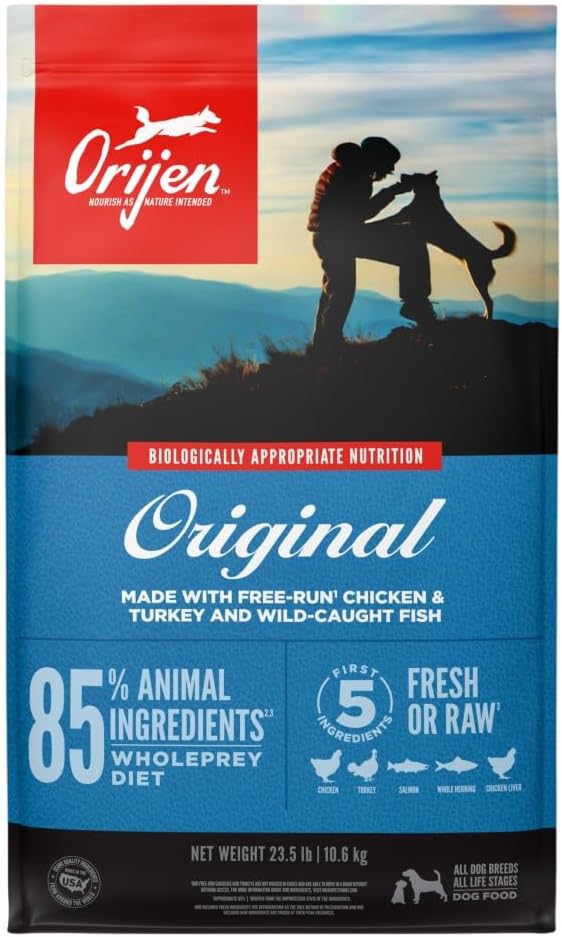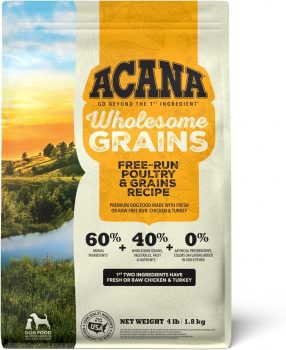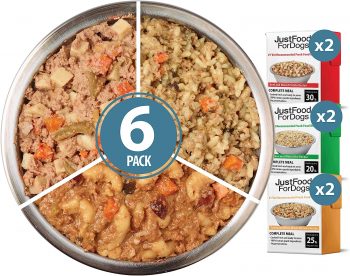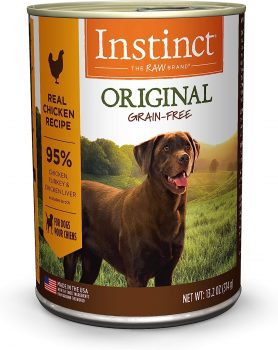The Chinese Shar-Pei, with its distinctive wrinkles and loyal temperament, is a breed that requires special attention when it comes to diet and nutrition. This guide is designed to provide comprehensive information on the ideal diet for Shar Peis, considering their unique dietary needs and common health issues.
Understanding Shar Pei Nutritional Needs
Shar Peis, like all dogs, requires a balanced diet that includes proteins, fats, carbohydrates, vitamins, and minerals. However, due to their unique physical characteristics and propensity for certain health issues, Shar Peis have specific dietary requirements. High-quality protein is crucial for muscle maintenance, while fats provide energy and support skin and coat health. Carbohydrates are essential for energy but should be given in moderation to avoid obesity.
Our 5 Top Foods for Shar Peis
The diets were selected by our founder Justin Palmer, a certified canine nutrition expert, specifically with Shar Peis in mind:
| Food | Pros | Cons |
|---|---|---|
|
|
|
|

Check Today's Price on: |
|
|

Check Today's Price on: |
|
|

Check Today's Price on: |
|
|

Check Today's Price on: |
|
|
Best Dog Food Choices for Shar Peis
When selecting dog food for Shar Peis, choose high-quality brands that specify meat as the first ingredient. Look for sources of lean protein like chicken, turkey, or fish. Grain-free options can be beneficial, particularly for Shar Peis with allergies or sensitivities. However, ensuring they still receive a balanced diet is essential, as grain-free diets sometimes lack the necessary nutrients.
Addressing Skin Allergies Through Diet
Shar Peis are prone to skin allergies, which can often be managed with the proper diet. A hypoallergenic diet, or a diet with novel protein sources (such as duck, venison, or kangaroo), can be helpful. Omega-3 and Omega-6 fatty acids, found in fish and flaxseed oils, also benefit skin health.
The Role of Hydration in Shar Pei Health
Hydration is essential for Shar Peis, as they can be prone to kidney and bladder stones. Always provide access to fresh, clean water, and consider wet food to increase moisture intake. Foods with high water content, like certain fruits and vegetables, can also aid in hydration.
Portion Control and Obesity Prevention
Due to their build and less active nature, Shar Peis are at risk of obesity. It’s important to control portion sizes and monitor their weight regularly. Follow feeding guidelines on dog food packaging as a starting point, and adjust as needed based on your dog’s activity level and metabolism.
Importance of Regular Feeding Schedules
Establishing a regular feeding schedule helps maintain your Shar Pei’s digestive health. Feeding two to three smaller meals daily, rather than one large meal, can aid digestion and nutrient absorption. This routine also helps in managing their energy levels and weight.
Supplements for Optimal Health
Some Shar Peis may benefit from dietary supplements. Glucosamine and chondroitin can support joint health, while probiotics can aid digestion. Antioxidant supplements can also be beneficial, particularly for older dogs. Always consult a veterinarian before adding any accessories to your dog’s diet.
Recognizing and Managing Food Allergies
Shar Peis are known to have sensitive stomachs and can develop food allergies. Symptoms of food allergies may include itching, ear infections, or gastrointestinal upset. If you suspect a food allergy, consult your vet, who may recommend an elimination diet to identify the allergen.
Treats and Snacks for Shar Peis
While treats are essential to training and bonding, they should be given in moderation. Choose healthy, low-calorie treats, and consider using fruits and vegetables, like carrots or apples, as snacks. Avoid human foods that are toxic to dogs, such as chocolate, grapes, and onions.
Transitioning to Senior Diet
As Shar Pei’s ages, their dietary needs change. Senior dogs may require diets lower in calories but higher in fiber, with added joint support supplements. Keep an eye on their weight as their metabolism slows, and adjust their diet to maintain optimal health.
Every Shar Pei is unique, and their dietary needs vary based on age, health, and activity level. By understanding the specific needs of your Shar Pei and providing a balanced diet tailored to them, you can ensure their health and well-being. Regular consultations with a veterinarian will help you keep your Shar Pei’s diet on track and address any health issues promptly.
What Health Issues Are Shar Peis Prone To, and How Can a Proper Diet Help?
The Shar Pei, a breed renowned for its deep wrinkles and solemn expression, possesses unique health challenges. This comprehensive guide explores the common health issues faced by Shar Peis and illustrates how a well-managed diet can play a pivotal role in prevention and management.
The Crucial Role of Diet in Managing Shar Pei Fever
One of the most notable conditions specific to Shar Peis is Shar Pei Fever, a hereditary disease characterized by periodic fever and swelling. While there’s no dietary cure, a well-balanced diet can strengthen the immune system. Foods rich in antioxidants and Omega-3 fatty acids, such as fish and flaxseed oils, can help reduce inflammation and support overall health.
Battling Skin Issues with Nutritional Choices
Shar Peis are infamous for their skin problems, including infections in their wrinkles and allergies. A diet high in Omega-3 and Omega-6 fatty acids can promote healthy skin and coat. Incorporating natural sources like fish, olive oil, and certain nuts can be beneficial. Additionally, hypoallergenic dog food formulas can help manage allergic reactions.
Digestive Health: A Priority for Shar Peis
This breed often suffers from sensitive stomachs and digestive issues. Probiotics and easily digestible proteins can aid in gut health. Feeding a consistent, high-quality diet with limited ingredient formulas can help reduce the risk of gastrointestinal upset.
Joint Health: Addressing Hip Dysplasia and Arthritis
Shar Peis are prone to joint issues like hip dysplasia and arthritis, partly due to their rapid growth as puppies. A diet enriched with glucosamine and chondroitin can support joint health. Maintaining an optimal weight through balanced nutrition is also vital to reduce common stress.
Eye Care: Nutrition’s Impact on Eye Health
Shar Peis can experience various eye problems due to their unique facial structure. Vitamins A and E in carrots, sweet potatoes, and leafy greens can support eye health. Regular vet check-ups are essential to monitor and address any eye issues early.
Preventing Obesity in Shar Peis
Given their less active nature, Shar Peis are susceptible to obesity, which can exacerbate many health problems. A diet with appropriate calorie content and regular exercise is crucial. Monitor portion sizes and avoid excessive treats to maintain a healthy weight.
Kidney and Bladder Health: Hydration and Diet
Kidney and bladder stones are concerns for Shar Peis. Ensuring ample hydration and a diet low in oxalates can help. Wet dog food or adding water to dry food can increase fluid intake, and ingredients like cranberries can support urinary tract health.
A Balanced Diet for a Strong Immune System
A robust immune system is crucial in combating the various health issues Shar Peis faces. A balanced diet that includes a variety of nutrients from high-quality proteins, fats, and carbohydrates, along with essential vitamins and minerals, can boost their immunity.
Navigating Food Allergies and Sensitivities
Shar Peis are often prone to food allergies and sensitivities. Identifying and eliminating allergenic foods is crucial. A diet with novel protein sources and limited ingredients can help minimize allergic reactions.
The Role of Diet in Longevity and Quality of Life
A nutritious diet can significantly impact the longevity and quality of life of Shar Peis. Feeding your Shar Pei with a diet appropriate for their life stage (puppy, adult, senior) and regularly consulting with a vet for dietary recommendations can help keep your Shar Pei healthy for years.
Conclusion: A Tailored Diet for a Healthy Shar Pei
Understanding and catering to the specific dietary needs of Shar Peis is crucial in managing their unique health issues. A well-balanced diet tailored to their needs can play a significant role in preventing and mitigating health problems, ensuring a long, happy, and healthy life for your beloved pet. Regular veterinary consultations are vital to keeping your Shar Pei’s diet and health on track.
Frequently Asked Questions About Feeding Shar Peis
1. What is the best type of dog food for Shar Peis?
The best dog food for Shar Peis is high-quality, balanced nutrition suitable for their age and size. Look for foods with high-quality proteins like chicken or fish as the first ingredient, and ensure they have a good balance of fats, carbohydrates, and essential nutrients. Avoid foods with artificial additives and fillers, as Shar Peis can have sensitive stomachs.
2. How much should I feed my Shar Pei?
The amount of food to feed your Shar Pei depends on their age, weight, activity level, and metabolism. Generally, adult Shar Peis needs about 1.5 to 2.5 cups of dry food per day, divided into two meals. However, this can vary, so you must consult your vet for specific recommendations.
3. Are grain-free diets good for Shar Peis?
Grain-free diets can benefit Shar Peis, especially those with allergies to grains or sensitivities to them. However, ensuring the diet is well-balanced and meets all their nutritional needs is essential. Consult with a veterinarian before switching to a grain-free diet.
4. How often should I feed my Shar Pei puppy?
Shar Pei puppies should be fed three to four times a day. As they grow, you can gradually reduce feeding to twice daily. It’s essential to provide puppy-specific food to support their growth and development.
5. Can Shar Peis eat raw food diets?
Yes, Shar Peis can eat raw food, but ensuring that the diet is balanced and safe is crucial. Raw diets should include the right proportions of meat, bones, fruits, and vegetables. Consult a veterinarian or a canine nutritionist to design a suitable raw diet plan.
6. What human foods are safe for Shar Peis?
Many human foods are safe and healthy for Shar Peis in moderation. These include lean meats, fruits like apples and blueberries, and vegetables like carrots and green beans. Always avoid toxic foods like chocolate, grapes, onions, and garlic.
7. How can I tell if my Shar Pei is overweight?
You can tell if your Shar Pei is overweight by feeling around its ribs and spine. Your dog might be fat if you can’t quickly feel its ribs without pressing hard. Also, look for a lack of a defined waist and a round, barrel-like shape.
8. What supplements should I add to my Shar Pei’s diet?
Supplements may be necessary for some Shar Peis, especially those with health conditions. Joint accessories include fish oil for skin and coat health, glucosamine for joint health, and probiotics for digestion. Always consult with your vet before adding any supplements.
9. Is it okay for Shar Peis to have dairy products?
Some dairy products like plain yogurt and cottage cheese can be okay for Shar Peis in small amounts. However, many dogs are lactose intolerant, so it’s essential to start with small portions and watch for adverse reactions like diarrhea or upset stomach.
10. How do I transition my Shar Pei to a new food?
To transition your Shar Pei to new food, mix the fresh food with the old one over 7-10 days, gradually increasing the amount of fresh food while decreasing the amount of old. This helps prevent digestive upset.
11. What are the signs of food allergies in Shar Peis?
Signs of food allergies in Shar Peis can include itchy skin, chronic ear infections, hair loss, excessive scratching, and gastrointestinal problems like diarrhea and vomiting. If you suspect a food allergy, consult your vet for diagnosis and treatment.
12. Can Shar Peis eat a vegetarian diet?
While dogs can technically survive on a well-planned vegetarian diet, it’s not ideal for Shar Peis. They are naturally carnivorous, and their diet should primarily consist of high-quality animal protein. Consult with a vet or canine nutritionist for guidance.
13. Should I feed my Shar Pei wet or dry food?
Choosing between wet and dry food depends on your dog’s dodog’sreference and health needs. Dry food is good for dental health, while wet food can be more palatable and hydrating. Some owners choose to mix both for variety and balance.
14. How can I prevent obesity in my Shar Pei?
To prevent obesity in Shar Peis, monitor their diet closely and ensure they get regular exercise. Feed them a balanced diet appropriate for their age and size, avoid overfeeding, and limit treats. Regular check-ups with a vet can also help maintain a healthy weight.
15. What is the importance of water in my Shar PePei’siet?
Water is essential for your Shar PePei’sealth. Ensure they have constant access to fresh, clean water. Dehydration can lead to serious health issues, especially in a breed prone to kidney problems. Providing wet food or adding water to dry kibble can also help increase their water intake.
 Check Today's Price on:
Check Today's Price on:
 Toledo, United States.
Toledo, United States.